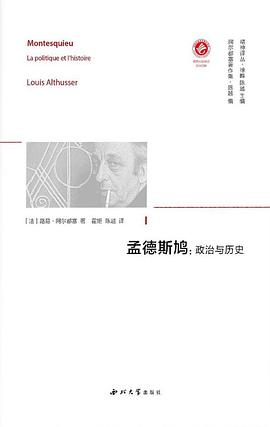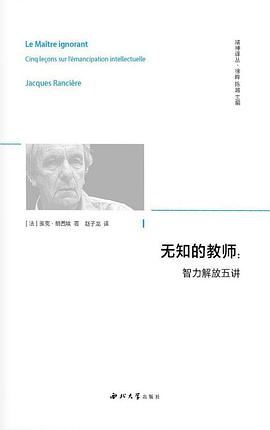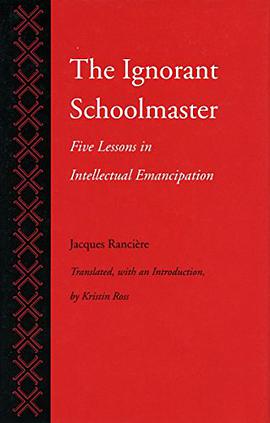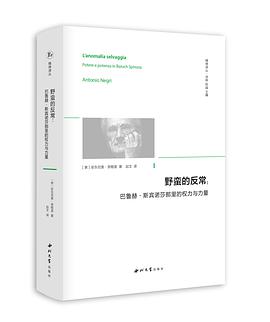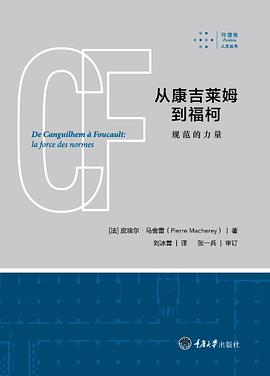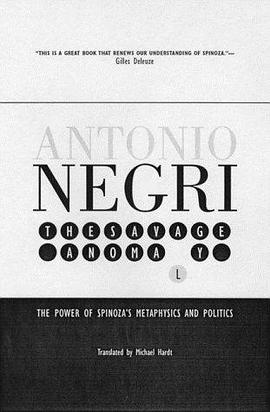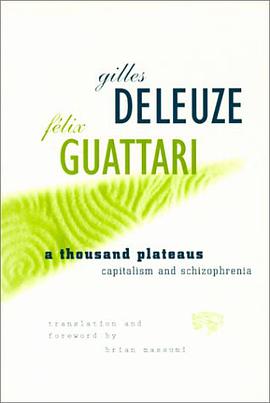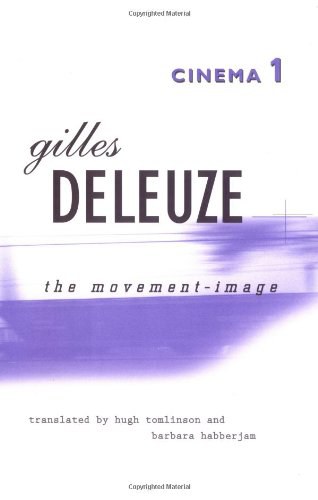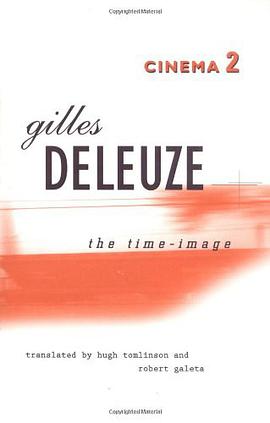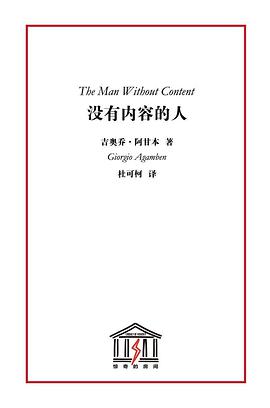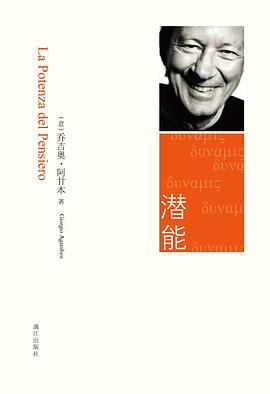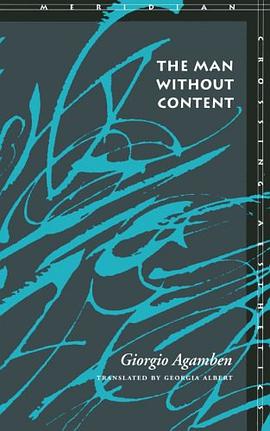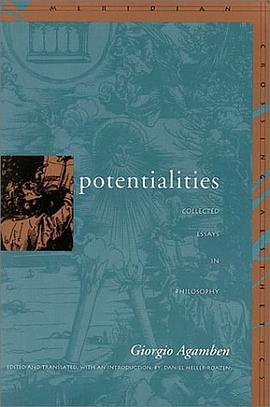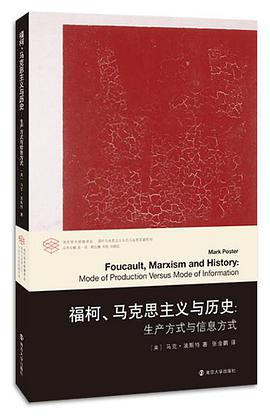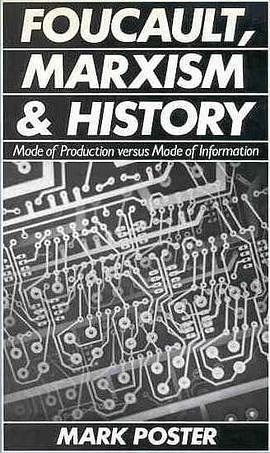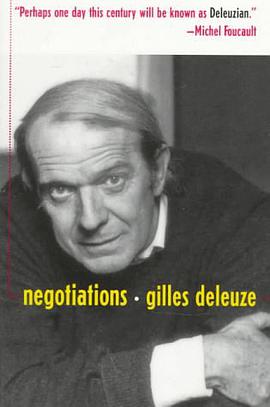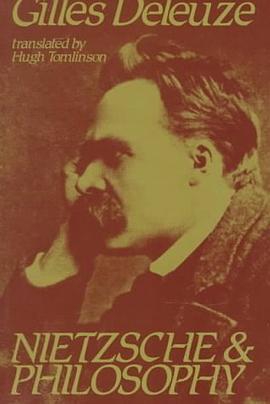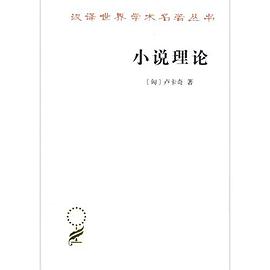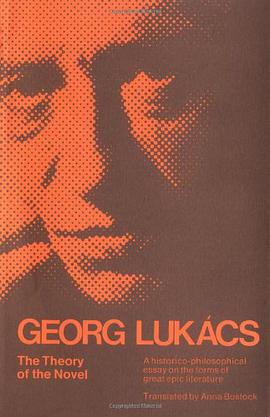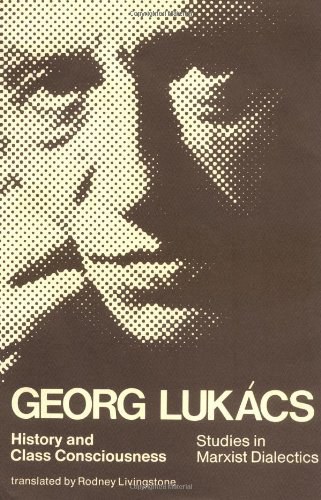哲学
The Ignorant Schoolmaster 豆瓣 Goodreads
作者:
Jacques Rancière
译者:
Kristin Ross
Stanford University Press
1991
- 7
Review
'An extremely provocative, original, and engaging book, it raises questions of great relevance and urgency about the process of cultural selection and canonization.'Denis Hollier, Yale UniversityIgnorant Schoolmaster
In The Ignorant Schoolmaster, Rancière uses the historical figure of Joseph Jacotot as a way of discussing human nature, education, pedagogy, ignorance, intelligence, and emancipation. These ideas have profound implications on the nature of schooling and research, and the role that teachers and scholars play. Contents [hide]
1 Joseph Jacotot (1770-1840)
2 Explication
3 Emancipation
4 Ignorance
5 Intelligence
6 Will
7 Language
[edit]
Joseph Jacotot (1770-1840)
Jacotot was a French instructor who taught subjects as far-ranging as French, literature, mathematics, ideology and law (p. 1). He had a profound realization one time when he had to teach a group of Flemish students French. Since he didn’t know Flemish himself, he had the challenge of teaching these students French.
[edit]
Explication
The conventional view of the teacher’s (or master’s, as Rancière calls it), is to “explicate”. But Jacotot noticed that his Flemish students were able to learn French without any explication from him. He had given them a bilingual text of Télémaque; using that, his students were able to eventually under French grammar and spelling, using a text that was aimed for adults, and not “simplified” for school children. Jacotot (or maybe Rancière?) was inspired to ask: Were schoolmaster’s explications superfluous? (p. 4) Rancière believes that explication stultifies learning by short-circuiting the journey that the student is able to make. Teachers who rely on explication inadvertently creates a “veil of ignorance” (p. 6) what the student is expected to learn, thus creating a world of superior (i.e. the master, the explicator) and inferior (i.e. the student, the ignorant). But Rancière believes that all people are capable of learning without explication because they have all acquired their mother tongues without explication (p. 5, 10). They learn, imitate, and correct themselves, and universally, all children will grow up to understand their parents without every spent one day in school. Why do we presume this intelligence goes away?
[edit]
Emancipation
Rancière distinguishes between two human traits: intelligence and will. In Jacotot’s classroom, there are two wills (the students’ and Jacotot’s) and two intelligences (the students’ and the book’s). Students may need to follow the teacher’s will, who guides them towards the subject. But stultification occurs when the students’ intelligences are linked with the teacher’s, when they have to rely on the schoolmaster to explain what they have learned. The opposite of stultification is, therefore, emancipation. But who emancipates? Once again, conventionally, it is the scholar, the philosopher, the wise, the learned, the Teachers College doctoral student. But Rancière believes that the only way to emancipate is when an intelligence obeys only itself even if its will obeys another’s will (p. 13). In reality, universal teaching has existed since the beginning of the world, alongside all the explicative methods...Everyone has done this experiment a thousand times in life, and yet it has never occurred to someone to say to someone else: I’ve learned many things without explanations, I think that you can too... (p. 16)In Jacotot’s class, the students learned using their own methods, not his. And in the end, they learned French, and they have done so using the oldest method in the world: universal teaching.
[edit]
Ignorance
Rancière argues that the “Socratic Method” is a perfected form of stultification, where the role of the Master is to interrogate (demand speech) and verify that intelligence is done with attention (p. 29). Even if these pedagogies are aimed at “empowering” the student, it is still done so after the master has verified it. Thus, it is still the master’s method, not the student’s.
The ignorant schoolmaster does not verify what the student has found, only that the student has searched (p. 31). This means that anyone, including illiterate parents, can teach their children how to read and write. For example, they can question whether they pronounce the same word each time in the same way, or hide it under their hand and ask the student what is under it. This is true not only for re
[edit]
Intelligence
Most people become stultified because they believe in their inferiority (p. 39). And superior minds can only be superior if they can make everyone else inferior. Thus we never break out of that circle, not matter how generous our intentions may be. The word intelligence is often understood as a number, or variable, that describes different people’s capacities to comprehend complex ideas or solve logic problems. But Rancière believes that everyone has the same intelligence (p. 50). He argues that a statement like “Bob is smarter because he produces better work” is a tautological statement that explains nothing. It’s true that people will produce different types of work, but he doesn’t see this as the result of different intelligence, but as a result of not bringing sufficient attention to the work.
[edit]
Will
Intelligence has to do with attention while will has to do with the “power to be moved” (p. 54). Rancière argues that each of us represents a will that is served by an intelligence. We see, analyze, compare, reason, correct, reconsider, on an everyday basis. We do not always learn the same things because we do not pay the same amount of attention to the situation. Furthermore, he suggests that “[m]eaning is the work of the will” (p. 56). He calls “secret” of universal teaching, something that geniuses all know. All humans are capable of anything they want.
[edit]
Language
Jacotot/Rancière believed that truth cannot be told. When it is expressed in language it becomes fragmented (p. 60). Hence, he goes into the arbitrariness of language to suggest that there is no language that is superior than others because they are equally arbitrary. Intelligence does not have a language. As Jacotot argued, we are not intelligent because we speak; we are intelligent because we exist. But this is not a problem. It is precisely because all languages are arbitrary that we employ all we have access to (including but not limited to language) in expressing truth. (p. 62) Rancière calls our expression through language as a form of art, like improvisation. He calls “telling the story” and “figuring things out” the two master operations of intelligence (p. 64). He believes that the artist is the exact opposite of the professor. He argues: “Each one of us is an artist to the extent that he carries out a double process; he is not content to be a mere journeyman but wants to make all work a means of expression, and he is not content to feel something but tries to impart it to others” (p. 70).
'An extremely provocative, original, and engaging book, it raises questions of great relevance and urgency about the process of cultural selection and canonization.'Denis Hollier, Yale UniversityIgnorant Schoolmaster
In The Ignorant Schoolmaster, Rancière uses the historical figure of Joseph Jacotot as a way of discussing human nature, education, pedagogy, ignorance, intelligence, and emancipation. These ideas have profound implications on the nature of schooling and research, and the role that teachers and scholars play. Contents [hide]
1 Joseph Jacotot (1770-1840)
2 Explication
3 Emancipation
4 Ignorance
5 Intelligence
6 Will
7 Language
[edit]
Joseph Jacotot (1770-1840)
Jacotot was a French instructor who taught subjects as far-ranging as French, literature, mathematics, ideology and law (p. 1). He had a profound realization one time when he had to teach a group of Flemish students French. Since he didn’t know Flemish himself, he had the challenge of teaching these students French.
[edit]
Explication
The conventional view of the teacher’s (or master’s, as Rancière calls it), is to “explicate”. But Jacotot noticed that his Flemish students were able to learn French without any explication from him. He had given them a bilingual text of Télémaque; using that, his students were able to eventually under French grammar and spelling, using a text that was aimed for adults, and not “simplified” for school children. Jacotot (or maybe Rancière?) was inspired to ask: Were schoolmaster’s explications superfluous? (p. 4) Rancière believes that explication stultifies learning by short-circuiting the journey that the student is able to make. Teachers who rely on explication inadvertently creates a “veil of ignorance” (p. 6) what the student is expected to learn, thus creating a world of superior (i.e. the master, the explicator) and inferior (i.e. the student, the ignorant). But Rancière believes that all people are capable of learning without explication because they have all acquired their mother tongues without explication (p. 5, 10). They learn, imitate, and correct themselves, and universally, all children will grow up to understand their parents without every spent one day in school. Why do we presume this intelligence goes away?
[edit]
Emancipation
Rancière distinguishes between two human traits: intelligence and will. In Jacotot’s classroom, there are two wills (the students’ and Jacotot’s) and two intelligences (the students’ and the book’s). Students may need to follow the teacher’s will, who guides them towards the subject. But stultification occurs when the students’ intelligences are linked with the teacher’s, when they have to rely on the schoolmaster to explain what they have learned. The opposite of stultification is, therefore, emancipation. But who emancipates? Once again, conventionally, it is the scholar, the philosopher, the wise, the learned, the Teachers College doctoral student. But Rancière believes that the only way to emancipate is when an intelligence obeys only itself even if its will obeys another’s will (p. 13). In reality, universal teaching has existed since the beginning of the world, alongside all the explicative methods...Everyone has done this experiment a thousand times in life, and yet it has never occurred to someone to say to someone else: I’ve learned many things without explanations, I think that you can too... (p. 16)In Jacotot’s class, the students learned using their own methods, not his. And in the end, they learned French, and they have done so using the oldest method in the world: universal teaching.
[edit]
Ignorance
Rancière argues that the “Socratic Method” is a perfected form of stultification, where the role of the Master is to interrogate (demand speech) and verify that intelligence is done with attention (p. 29). Even if these pedagogies are aimed at “empowering” the student, it is still done so after the master has verified it. Thus, it is still the master’s method, not the student’s.
The ignorant schoolmaster does not verify what the student has found, only that the student has searched (p. 31). This means that anyone, including illiterate parents, can teach their children how to read and write. For example, they can question whether they pronounce the same word each time in the same way, or hide it under their hand and ask the student what is under it. This is true not only for re
[edit]
Intelligence
Most people become stultified because they believe in their inferiority (p. 39). And superior minds can only be superior if they can make everyone else inferior. Thus we never break out of that circle, not matter how generous our intentions may be. The word intelligence is often understood as a number, or variable, that describes different people’s capacities to comprehend complex ideas or solve logic problems. But Rancière believes that everyone has the same intelligence (p. 50). He argues that a statement like “Bob is smarter because he produces better work” is a tautological statement that explains nothing. It’s true that people will produce different types of work, but he doesn’t see this as the result of different intelligence, but as a result of not bringing sufficient attention to the work.
[edit]
Will
Intelligence has to do with attention while will has to do with the “power to be moved” (p. 54). Rancière argues that each of us represents a will that is served by an intelligence. We see, analyze, compare, reason, correct, reconsider, on an everyday basis. We do not always learn the same things because we do not pay the same amount of attention to the situation. Furthermore, he suggests that “[m]eaning is the work of the will” (p. 56). He calls “secret” of universal teaching, something that geniuses all know. All humans are capable of anything they want.
[edit]
Language
Jacotot/Rancière believed that truth cannot be told. When it is expressed in language it becomes fragmented (p. 60). Hence, he goes into the arbitrariness of language to suggest that there is no language that is superior than others because they are equally arbitrary. Intelligence does not have a language. As Jacotot argued, we are not intelligent because we speak; we are intelligent because we exist. But this is not a problem. It is precisely because all languages are arbitrary that we employ all we have access to (including but not limited to language) in expressing truth. (p. 62) Rancière calls our expression through language as a form of art, like improvisation. He calls “telling the story” and “figuring things out” the two master operations of intelligence (p. 64). He believes that the artist is the exact opposite of the professor. He argues: “Each one of us is an artist to the extent that he carries out a double process; he is not content to be a mere journeyman but wants to make all work a means of expression, and he is not content to feel something but tries to impart it to others” (p. 70).
从康吉莱姆到福柯 豆瓣
De Canguilhem à Foucault.La force des normes
7.7 (6 个评分)
作者:
[法] 皮埃尔·马舍雷
译者:
刘冰菁
拜德雅丨重庆大学出版社
2016
-编辑推荐-
•收录法国著名马克思主义理论家路易•阿尔都塞的得意门生——皮埃尔•马舍雷对“规范”问题长达30多年的研究文章。
•对于中国学界而言,福柯早已是征引频频的经典思想家。但我们往往忽略了福柯思想脉络(尤其是他的代表作《古典时代疯狂史》)的源头,即他的老师乔治•康吉莱姆的思想。毫不夸张地说,正是沿着康吉莱姆的指引,福柯逐渐探索出了自己的研究特长所在。
•康吉莱姆的重要代表作《正常与病态》已出版中译本,我们非常有必要重新检视康吉莱姆到福柯这样一条思想发展线索,这既有助于我们理解福柯的思想取径,也有助于我们进入康吉莱姆的思想场域。
•马舍雷这本书正是在这一点上进行了细致入微的开掘:它专注于“规范”这一重要概念,重新梳理康吉莱姆到福柯的思想演变关系。因而,对于时下的读者来说,这是一部非常重要的著述,而且,它本身便是这思考的结晶。
-内容简介-
本书汇集了皮埃尔•马舍雷从1963年到1993年这三十来年所撰写的关于“规范”问题的文章,它见证了作为哲学工作者的马舍雷这些年的研究路线,不仅仅关注纯粹的思辨问题,而是关注康吉莱姆经常引用和评论的一句话:“所有陌生的内容都是好的”。本书由以下五篇文章组成:
(1)《乔治•康吉莱姆的科学哲学:关于诸科学的认识论和历史》。这是马舍雷在学生时期就康吉莱姆的思想所作的报告,后经康吉莱姆推荐,发表在由福柯任编委的久负盛名的《批判》杂志上。当时,康吉莱姆本人受阿尔都塞邀请到场聆听了这场“讨论他的思想”的报告。后来,当该文章以后记出版于巴西版《正常与病态》时,康吉莱姆认为“这篇文章是失真的”。
(2)《规范的自然史》。这是马舍雷为1988年1月召开的“哲学家米歇尔•福柯”国际会议所作。正如本文作者所说,该文“是为了更深入地探索福柯工作中狡猾的方面,为了更好地描绘出其哲学的轮廓”。作者认为,将福柯和斯宾诺莎放在一起阅读是有一定的意义的。
(3)《通过福柯:从康吉莱姆到康吉莱姆》。这是马舍雷在国际哲学研究院于1990年12月举办的一个主题为“乔治•康吉莱姆,哲学家,科学史学家”的研讨会上所作的发言。该文奇怪的标题,正是马舍雷想要说明的,那些将福柯和康吉莱姆既联系又区分开来的东西,以及贯穿其中的差距和紧张,都将两人的关系变得更加令人兴奋。
(4)《乔治•康吉莱姆:一种思想的风格》。这是马舍雷受《哲学手册》之约为一期纪念康吉莱姆逝世的专刊而写的文章。马舍雷在写下这篇文章时,再次感受到了康吉莱姆的教诲和其作品对他个人的影响。
(5)《〈关于正常与病态的一些问题〉中的生命规范和社会规范》。这是马舍雷为1993年召开的精神病学和精神分析社会史第五届国际研讨会所作的演讲。马舍雷指出,康吉莱姆的医学博士论文《关于正常与病态的一些问题》的中心思想是关于“生命体的经验”。康吉莱姆关心的是生命规范和社会规范如何相互影响,他非常重视规范问题的生存维度,对他来说,哲学思考和对日常生活的关注从未完全分离。
•收录法国著名马克思主义理论家路易•阿尔都塞的得意门生——皮埃尔•马舍雷对“规范”问题长达30多年的研究文章。
•对于中国学界而言,福柯早已是征引频频的经典思想家。但我们往往忽略了福柯思想脉络(尤其是他的代表作《古典时代疯狂史》)的源头,即他的老师乔治•康吉莱姆的思想。毫不夸张地说,正是沿着康吉莱姆的指引,福柯逐渐探索出了自己的研究特长所在。
•康吉莱姆的重要代表作《正常与病态》已出版中译本,我们非常有必要重新检视康吉莱姆到福柯这样一条思想发展线索,这既有助于我们理解福柯的思想取径,也有助于我们进入康吉莱姆的思想场域。
•马舍雷这本书正是在这一点上进行了细致入微的开掘:它专注于“规范”这一重要概念,重新梳理康吉莱姆到福柯的思想演变关系。因而,对于时下的读者来说,这是一部非常重要的著述,而且,它本身便是这思考的结晶。
-内容简介-
本书汇集了皮埃尔•马舍雷从1963年到1993年这三十来年所撰写的关于“规范”问题的文章,它见证了作为哲学工作者的马舍雷这些年的研究路线,不仅仅关注纯粹的思辨问题,而是关注康吉莱姆经常引用和评论的一句话:“所有陌生的内容都是好的”。本书由以下五篇文章组成:
(1)《乔治•康吉莱姆的科学哲学:关于诸科学的认识论和历史》。这是马舍雷在学生时期就康吉莱姆的思想所作的报告,后经康吉莱姆推荐,发表在由福柯任编委的久负盛名的《批判》杂志上。当时,康吉莱姆本人受阿尔都塞邀请到场聆听了这场“讨论他的思想”的报告。后来,当该文章以后记出版于巴西版《正常与病态》时,康吉莱姆认为“这篇文章是失真的”。
(2)《规范的自然史》。这是马舍雷为1988年1月召开的“哲学家米歇尔•福柯”国际会议所作。正如本文作者所说,该文“是为了更深入地探索福柯工作中狡猾的方面,为了更好地描绘出其哲学的轮廓”。作者认为,将福柯和斯宾诺莎放在一起阅读是有一定的意义的。
(3)《通过福柯:从康吉莱姆到康吉莱姆》。这是马舍雷在国际哲学研究院于1990年12月举办的一个主题为“乔治•康吉莱姆,哲学家,科学史学家”的研讨会上所作的发言。该文奇怪的标题,正是马舍雷想要说明的,那些将福柯和康吉莱姆既联系又区分开来的东西,以及贯穿其中的差距和紧张,都将两人的关系变得更加令人兴奋。
(4)《乔治•康吉莱姆:一种思想的风格》。这是马舍雷受《哲学手册》之约为一期纪念康吉莱姆逝世的专刊而写的文章。马舍雷在写下这篇文章时,再次感受到了康吉莱姆的教诲和其作品对他个人的影响。
(5)《〈关于正常与病态的一些问题〉中的生命规范和社会规范》。这是马舍雷为1993年召开的精神病学和精神分析社会史第五届国际研讨会所作的演讲。马舍雷指出,康吉莱姆的医学博士论文《关于正常与病态的一些问题》的中心思想是关于“生命体的经验”。康吉莱姆关心的是生命规范和社会规范如何相互影响,他非常重视规范问题的生存维度,对他来说,哲学思考和对日常生活的关注从未完全分离。
The Savage Anomaly 豆瓣
作者:
Antonio Negri
University of Minnesota Press
2000
- 2
In this essential rereading of Spinoza's (1632-1677) philosophical and political writings, Negri positions this thinker within the historical context of the development of the modern state and its attendant political economy. Through a close examination of Spinoza, Negri reveals turn as unique among his contemporaries for his nondialectical approach to social organization in a bourgeois age.
A Thousand Plateaus 豆瓣 Goodreads
Mille Plateaux
作者:
Gilles Deleuze
/
Felix Guattari
译者:
Brian Massumi
University of Minnesota Press
1987
A Thousand Plateaus continues the work Gilles Deleuze and Félix Guattari began in Anti-Oedipus and has now become established as one of the classic studies of the development of critical theory in the late twentieth century. It occupies an important place at the center of the debate reassessing the works of Freud and Marx, advancing an approach that is neither Freudian nor Marxist but which learns from both to find an entirely new and radical path. It presents an attempt to pioneer a variety of social and psychological analyses free of the philosophical encumbrances criticized by postmodern writers. A Thousand Plateaus is an essential text for feminists, literary theorists, social scientists, philosophers, and others interested in the problems of contemporary Western culture.
Cinema 1 豆瓣
作者:
Gilles Deleuze
Univ Of Minnesota Press
1986
- 10
First published in France in 1983, this is at once a revolutionary work in philosophy and a book about cinema. For Deleuze, philosophy cannot be a reflection of something else; philosophical concepts are, rather, the images of thought, to be understood on their own terms. Here he puts this view of philosophy to work in understanding the concepts-or images-of film. Cinema, to Deleuze, is not a language that requires probing and interpretation, a search for hidden meanings; it can be understood directly, as a composition of images and signs, pre-verbal in nature. Thus he offers a powerful alternative to the psychoanalytic and semiological approaches that have dominated film studies.
Drawing upon Henri Bergson's thesis on perception and C. S. Peirce's classification of images and signs, Deleuze is able to put forth a new theory and taxonomy of the image, which he then applies to concrete examples from the work of a diverse group of filmmakers—Griffith, Eisenstein, Pasolini, Rohmer, Bresson, Dreyer, Stroheim, Buñuel, and many others. Because he finds movement to be the primary characteristic of cinema in the first half of the twentieth century, he devotes this first volume to that aspect of film. In the years since World War II, time has come to dominate film; that shift, and the signs and images associated with it, are addressed in Cinema 2: The Time-Image.
"The appearance of [this book] is an exciting event for film study and one that well deserves serious attention and commentary." —Film Quarterly
Drawing upon Henri Bergson's thesis on perception and C. S. Peirce's classification of images and signs, Deleuze is able to put forth a new theory and taxonomy of the image, which he then applies to concrete examples from the work of a diverse group of filmmakers—Griffith, Eisenstein, Pasolini, Rohmer, Bresson, Dreyer, Stroheim, Buñuel, and many others. Because he finds movement to be the primary characteristic of cinema in the first half of the twentieth century, he devotes this first volume to that aspect of film. In the years since World War II, time has come to dominate film; that shift, and the signs and images associated with it, are addressed in Cinema 2: The Time-Image.
"The appearance of [this book] is an exciting event for film study and one that well deserves serious attention and commentary." —Film Quarterly
Cinema 2 豆瓣
作者:
Gilles Deleuze
译者:
Hugh Tomlinson
/
Robert Galeta
Univ Of Minnesota Press
1989
- 8
Cinema 2: The Time-Image brings to completion Gilles Deleuze's work on the theoretical implications of the cinematographic image. In Cinema 1: The Movement-Image, Deleuze proposed a new way to understand narrative cinema, based on Henri Bergson's notion of the movement-image and C. S. Peirce's classification of images and signs. In Cinema 2, he explains why, since World War II, time has come to dominate film: the fragment or solitary image, in supplanting narrative cinema's rational development of events, illustrates this new significance of time.
Deleuze ascribes this shift to the condition of postwar Europe: the situations and spaces "we no longer know how to describe"—buildings deserted but inhabited, cities undergoing demolition or reconstruction—and the new race of characters who emerged from this rubble, mutants, who "saw rather than acted." Deleuze discusses the films of Rossellini, De Sica, Fellini, Godard, Resnais, Antonioni, Pasolini, Rohmer, Ophuls, and many others, suggesting that contemporary cinema, far from being dead, is only beginning to find new ways to capture time in the image.
Deleuze ascribes this shift to the condition of postwar Europe: the situations and spaces "we no longer know how to describe"—buildings deserted but inhabited, cities undergoing demolition or reconstruction—and the new race of characters who emerged from this rubble, mutants, who "saw rather than acted." Deleuze discusses the films of Rossellini, De Sica, Fellini, Godard, Resnais, Antonioni, Pasolini, Rohmer, Ophuls, and many others, suggesting that contemporary cinema, far from being dead, is only beginning to find new ways to capture time in the image.
没有内容的人 豆瓣
The Man Without Content
作者:
[意]吉奥乔·阿甘本
译者:
杜可柯
仅供内部参考学习
2015
- 5
吉奥乔·阿甘本最著名的论著均属于政治哲学领域,国内也不乏出版,但其处女作讨论的却是诗学和美学。《没有内容的人》是他系统性地探讨美学和艺术的重要著作,最早出版于1970年,如今重读却并不让人感觉过时。相反,倒好像经过后现代主义洗礼以后,我们对书里提出的若干核心问题更能感同身受。康德在《判断力批判》中提出了审美判断四大原则:无利害关心的愉悦、无概念的普遍性、无目的的合目的性、无规范的规范性。然而,随着从观者感性经验出发的审美概念在艺术体验里占据越来越重要的位置,某种分裂也越来越明显:批评与创作、趣味与天才、审美判断与创作原理……本书中,阿甘本将目光对准上述让现代作者和观者困扰不已的两难关系,从根源上对审美概念本身提出了质疑。值得一提的是,哈尔·福斯特(Hal Foster)的《反美学》(Anti-aesthetics)1983年出版;特里·伊格尔顿(Terry Eagleton)的《审美意识形态》(The Ideology of The Aesthetic)完成于1990年。相比之下,我们不得不承认,在同一个问题上,阿甘本的见解非常早熟。这也是为什么时至今日,这本书仍未丧失其最初的力量。
The Man Without Content 豆瓣
作者:
Giorgio Agamben
译者:
Georgia Albert
Stanford University Press
1999
- 6
In this book, one of Italy's most important and original contemporary philosophers considers the status of art in the modern era. He takes seriously Hegel's claim that art has exhausted its spiritual vocation, that it is no longer through art that Spirit principally comes to knowledge of itself. He argues, however, that Hegel by no means proclaimed the "death of art" (as many still imagine) but proclaimed rather the indefinite continuation of art in what Hegel called a "self-annulling" mode. With astonishing breadth and originality, the author probes the meaning, aesthetics, and historical consequences of that self-annulment. In essence, he argues that the birth of modern aesthetics is the result of a series of schisms--between artist and spectator, genius and taste, and form and matter, for example--that are manifestations of the deeper, self-negating yet self-perpetuating movement of irony. Through this concept of self-annulment, the author offers an imaginative reinterpretation of the history of aesthetic theory from Kant to Heidegger, and he opens up original perspectives on such phenomena as the rise of the modern museum, the link between art and terror, the natural affinity between "good taste" and its perversion, and kitsch as the inevitable destiny of art in the modern era. The final chapter offers a dazzling interpretation of Durer's "Melancholia" in the terms that the book has articulated as its own. "The Man Without Content" will naturally interest those who already prize Agamben's work, but it will also make his name relevant to a whole new audience--those involved with art, art history, the history of aesthetics, and popular culture.
Potentialities 豆瓣
作者:
Giorgio Agamben
译者:
Heller-Roazen, Daniel
Stanford University Press
2000
- 1
This book collects fifteen major philosophical essays written over a period of more than twenty years by acclaimed Italian philosopher Giorgio Agamben. The volume opens with an introduction in which the editor situates Agamben's work with respect to both the history of philosophy and contemporary European thought. The essays that follow articulate a series of theoretical confrontations with privileged figures in the history of philosophy, politics, and criticism, from Plato to Spinoza, Aristotle to Deleuze, Carl Schmitt to Benjamin, Hegel to Aby Warburg, and Heidegger to Derrida. Three fundamental concepts organize the collection as a whole: language, in the sense not of particular statements but rather the very taking place of speech, the pure fact of language's existence; history, as it appears from a perspective in which tradition, transmission, and memory reach their messianic fulfillment; and potentiality, understood as a fundamental problem of metaphysics, ethics, and the philosophy of language. All these topics converge in the final part of the book, in which Agamben offers an extensive reading of Melville's short story "Bartleby the Scrivener" as a work that puts potentiality and actuality, possibility and reality, in an altogether new light.
福柯、马克思主义与历史 豆瓣
Foucault, Marxism, and History : Mode of Production Versus Mode of Information
作者:
[美] 马克·波斯特
译者:
张金鹏
南京大学出版社
2015
本书原为考察福柯论社会理论与社会史的最新著作的价值的一组论文。福柯自1968年以来写作的著作包含着某些社会理论和社会史著述中的重要进展。作者试图从其所发现的具有较小价值的其他福柯思想的特征中析出那些进展。作者将福柯的著作置于双重问题式中:社会批判理论的以及称之为“信息方式”的新社会构型的问题式。作者试图证明,福柯提供了包括理论因素的分析模式,如果对这些理论因素进行恰当的解释,就能为批判理论开启新方向,并将之带出他当前的困境。
Foucault, Marxism, and History 豆瓣
作者:
Mark Poster
Blackwell Pub
1985
- 3
Negotiations 1972-1990 豆瓣
作者:
Gilles Deleuze
译者:
Martin Joughin
Columbia University Press
1997
- 4
Negotiations traces the intellectual journey of a man widely acclaimed as one of the most important French philosphers. A provocative guide to Deleuze by Deleuze, the collection clarifies the key critical concepts in the work of this vital figure in contemporary philosphy, who has had a lasting impact on a variety of disciplines, including aesthetics, film theory, psycho-analysis, and cultural studies.
Nietzsche and Philosophy 豆瓣
Nietzsche et la philosophie
作者:
Gilles Deleuze
Columbia University Press
1983
- 4
-- Times Higher Education Supplement</P><br/>
Nietzsche and Philosophy has long been recognized as one of the most important accounts of Nietzsche's philosophy, acclaimed for its rare combination of scholarly rigour and imaginative interpretation. Yet this is more than a major work on Nietzsche: the book opened a whole new avenue in post-war thought. Here Deleuze shows how Nietzsche began a new way of thinking which breaks with the dialectic as a method and escapes the confines of philosophy itself.</P>
Nietzsche and Philosophy has long been recognized as one of the most important accounts of Nietzsche's philosophy, acclaimed for its rare combination of scholarly rigour and imaginative interpretation. Yet this is more than a major work on Nietzsche: the book opened a whole new avenue in post-war thought. Here Deleuze shows how Nietzsche began a new way of thinking which breaks with the dialectic as a method and escapes the confines of philosophy itself.</P>
The Theory of the Novel Goodreads 豆瓣
作者:
Georg Lukacs
The MIT Press
1974
- 1
Georg Lukacs wrote The Theory of the Novel in 1914-1915, a period that also saw the conception of Rosa Luxemburg's Spartacus Letters , Lenin's Imperialism: The Highest Stage of Capitalism , Spengler's Decline of the West , and Ernst Bloch's Spirit of Utopia . Like many of Lukacs's early essays, it is a radical critique of bourgeois culture and stems from a specific Central European philosophy of life and tradition of dialectical idealism whose originators include Kant, Hegel, Novalis, Marx, Kierkegaard, Simmel, Weber, and Husserl.
The Theory of the Novel marks the transition of the Hungarian philosopher from Kant to Hegel and was Lukacs's last great work before he turned to Marxism-Leninism.
The Theory of the Novel marks the transition of the Hungarian philosopher from Kant to Hegel and was Lukacs's last great work before he turned to Marxism-Leninism.
History and Class Consciousness 豆瓣 Goodreads
作者:
Georg Lukács
译者:
Rodney Livingstone
The MIT Press
1972
- 11
This is the first time one of the most important of Lukacs' early theoretical writings, published in Germany in 1923, has been made available in English. The book consists of a series of essays treating, among other topics, the definition of orthodox Marxism, the question of legality and illegality, Rosa Luxemburg as a Marxist, the changing function of Historic Marxism, class consciousness, and the substantiation and consciousness of the Proletariat.Writing in 1968, on the occasion of the appearance of his collected works, Lukacs evaluated the influence of this book as follows:"For the historical effect of History and Class Consciousness and also for the actuality of the present time one problem is of decisive importance: alienation, which is here treated for the first time since Marx as the central question of a revolutionary critique of capitalism, and whose historical as well as methodological origins are deeply rooted in Hegelian dialectic. It goes without saying that the problem was omnipresent. A few years after History and Class Consciousness was published, it was moved into the focus of philosophical discussion by Heidegger in his Being and Time, a place which it maintains to this day largely as a result of the position occupied by Sartre and his followers. The philologic question raised by L. Goldmann, who considered Heidegger's work partly as a polemic reply to my (admittedly unnamed) work, need not be discussed here. It suffices today to say that the problem was in the air, particularly if we analyze its background in detail in order to clarify its effect, the mixture of Marxist and Existentialist thought processes, which prevailed especially in France immediately after the Second World War. In this connection priorities, influences, and so on are not particularly significant. What is important is that the alienation of man was recognized and appreciated as the central problem of the time in which we live, by bourgeois as well as proletarian, by politically rightist and leftist thinkers. Thus, History and Class Consciousness exerted a profound effect in the circles of the youthful intelligentsia."George Lichtheim, also in 1968, writes that "...The originality of the early Lukacs lay in the assertion that the totality of history could be apprehended by adopting a particular 'class standpoint': that of the proletariat. Class consciousness;not indeed the empirical consciousness of the actual proletariat, which was hopelessly entangled with the surface aspects of objective reality, but an ideal-typical consciousness proper to a class which radically negates the existing order of reality: that was the formula which had made it possible for the Lukacs of 1923 to unify theory and practice."
